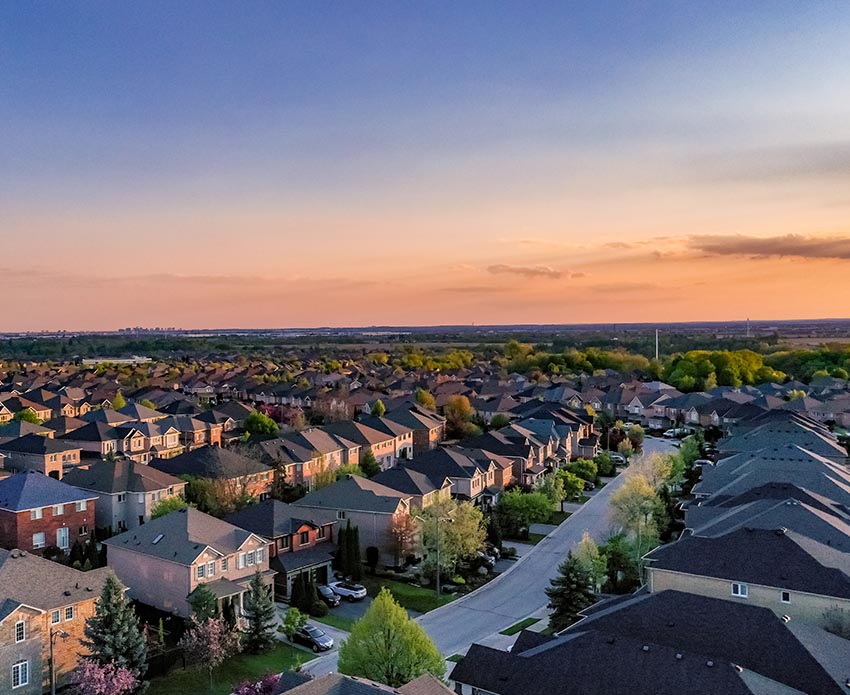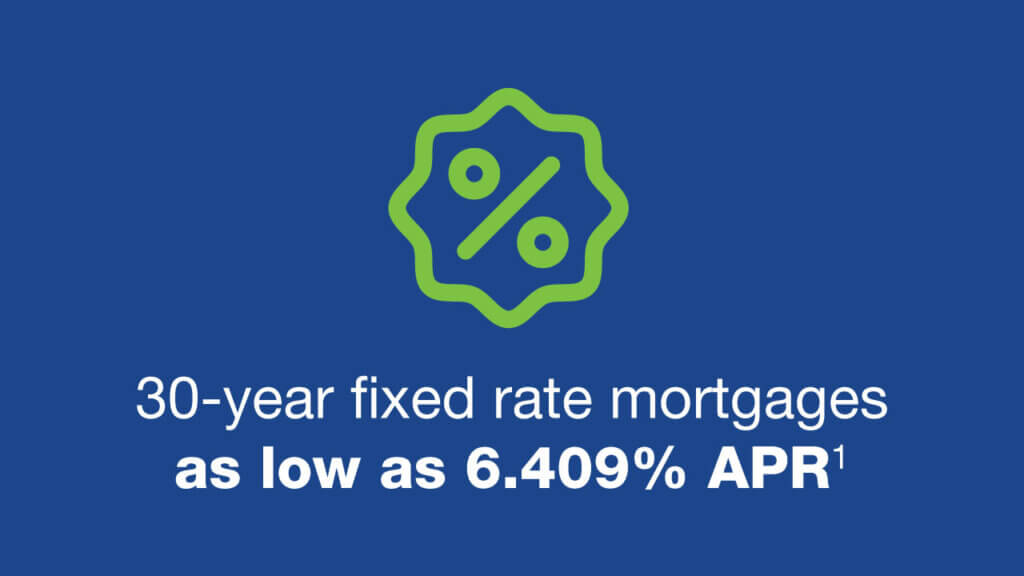With several types of mortgage loans available, it helps to know the details. Read up about them below or contact us to start your application today.
7 Main Types of Mortgage Loans


We’re here to help you meet your homeownership goals! We also prioritize speed for clients, with an average turnaround of only 22 days from application completion to ready-to-close for purchase loans!1

How Many Types of Home Loans are There?
There are, of course, more than seven types of home loans–but these are the seven that matter most when you’re ready to buy a home with us. Depending on your personal financial situation, some loans may be a better fit than others. What’s most important is that you work with a trusted mortgage lender to choose the one that works for your budget and your plans. Remember, the type of loan you choose determines your monthly payment, so be sure to research the differences between each.
7 Main Types of Mortgage Loans
Need to make a lower down payment? Looking for low interest rates? Buying an expensive home? There’s a loan for that. Here are the seven most common types of home loans.
- Fixed Rate Mortgage
- Adjustable Rate Mortgage
- FHA Mortgage
- VA Mortgage
- USDA Mortgage
- Jumbo Mortgage
- Doctor Mortgage
1. Fixed Rate Mortgage
Most people are familiar with fixed rate mortgages. As the name suggests, these home loans have the same (or fixed) interest rates over the course of the loan’s life.
Another benefit of fixed rate mortgages is that they may be offered at several different term lengths (instead of only one or two term options like other loans). They’re good fits for buyers who plan to live in their houses for a long time and prefer consistent and predictable monthly payments. Searching for your “forever home?” Fixed rate may be the perfect choice.
2. Adjustable Rate Mortgage (ARM)
Unlike fixed rate mortgages, adjustable rate mortgages (ARMs) change over time. During an introductory period, ARM interest rates may be lower than other average rates. After a set period, those interest rates can rise or fall. This means your monthly payment may change over time.
An adjustable rate mortgage can be both advantageous and risky, depending on how the market changes over time. If you only plan to live in your house for a few years, you’ll enjoy the lower-than-average interest rates. But if you stay in your home longer and interest rates rise, you could end up paying more every month.
3. FHA Mortgage
Homebuyers with existing debt, lower credit scores, or smaller down payments are often good candidates for Federal Housing Authority (FHA) loans. Your credit score will determine the amount you need to put down, and generally, the lower your credit score is, the more you’ll need for your down payment. FHA home loans have more flexible requirements, but applicants who qualify will need to purchase mortgage insurance to protect the lender in the event they default on the loan. Still, FHA loans can considerably lower barriers to homeownership for many people across Nevada and California.
4. VA Mortgage
Veterans, active duty service members and even their surviving spouses are generally eligible for U.S. Department of Veterans Affairs (VA) loans. VA home loans typically do not require a down payment and offer lower-than-average interest rates.
Many lenders may have additional qualification requirements for VA loans, but in general, you must have been honorably discharged, be serving in active duty or be a surviving spouse of a service member.
5. USDA Mortgage
The U.S. Department of Agriculture (USDA) offers home loans for low-income homebuyers interested in living in eligible rural areas. USDA home loans were specifically created to help rural communities grow and thrive, so they can be great options for buyers who are looking for something away from major metro areas. It is important to note that some suburbs of metro areas can qualify for a USDA home loan.
USDA loans generally come with lower than average interest rates and do not require down payments. They can be incredibly helpful if you’ve struggled to gather down payment funds or need a lower monthly mortgage payment.
6. Jumbo Mortgage
Interested in purchasing a more expensive home in a more competitive market? You’ll probably need a jumbo loan. Jumbo home loans exceed Federal Housing Finance Agency (FHFA) conforming limits and come with more rigorous requirements than traditional loans. To qualify for jumbo loans, borrowers need very good credit scores and lower debt-to-income ratios. They should also be prepared to navigate the distinctive underwriting requirements of borrowing this amount.
7. Doctor Mortgage
If you happen to be a medical professional, be sure to consider a doctor home loan (also called a physician loan). These loans are tailored to newly graduated doctors or out of residency, who tend to have high debt-to-income ratios right after medical school.
Which Home Loan is Right for You?
Looking for a match made in mortgage heaven? Find the perfect fit based on your plans and needs.
Fixed Rate Mortgages
Planning on living in your home for a while or longer? Enjoy peace of mind with a predictable, never-changing monthly payment.
Adjustable Rate Mortgages (ARM)
If you’re more like a tumbleweed and plan on living in your home for a shorter period, sit back and relax with a lower-than-average interest rate–at least for the introductory period.
Jumbo Loans
Stay competitive in the hottest real estate markets with a jumbo loan that makes luxury home ownership possible.
FHA Loans
Low credit score? Low down payment? No problem. FHA loans are here to help you.
USDA Loans
If the country is calling, pick up the phone and ask about a USDA loan specifically tailored for rural-bound, low-income homebuyers.
VA Loans
Veterans, active duty service members and surviving spouses can enjoy low interest rates (and maybe even skip the down payment) with VA loans.
Doctor/Physician Loans
If you’re fresh out of med school or residency, this could very well be your most straightforward path to homeownership.

Everyone Deserves a Home
According to the National Alliance to End Homelessness, over 8,600 Nevadans experience homelessness on any given night. GNM’s Keys to Greater program donates a portion of the revenue from every new mortgage or refinance to community nonprofit organizations that address homelessness, and since launching in 2021, over $206,000 has been donated!

1Annual Percentage Rate (APR) is based on a loan amount of $450,000 at 80% Loan-to-Value with a credit score of 700 for conforming loans. Rates and fees are subject to change without notice. Membership with Greater Nevada Credit Union is required prior to loan funding, which is open to anyone living or working in any of Nevada’s 17 counties and members of their immediate family. Average purchase loan turnaround time is based on application completion to final approval, with all required conditions and guidelines being met awaiting the Close of Escrow date, for April 2025. This is not a guaranteed timeframe for all loan applications. Each loan transaction is different, and individual turnaround times will vary.